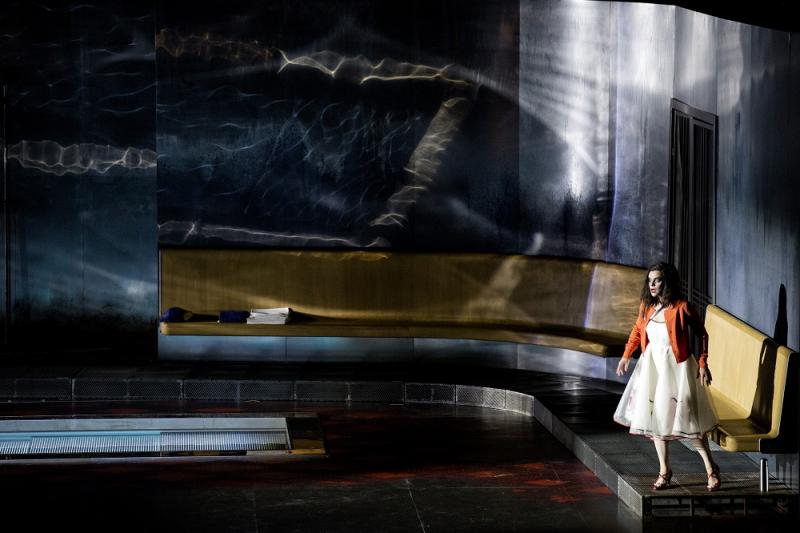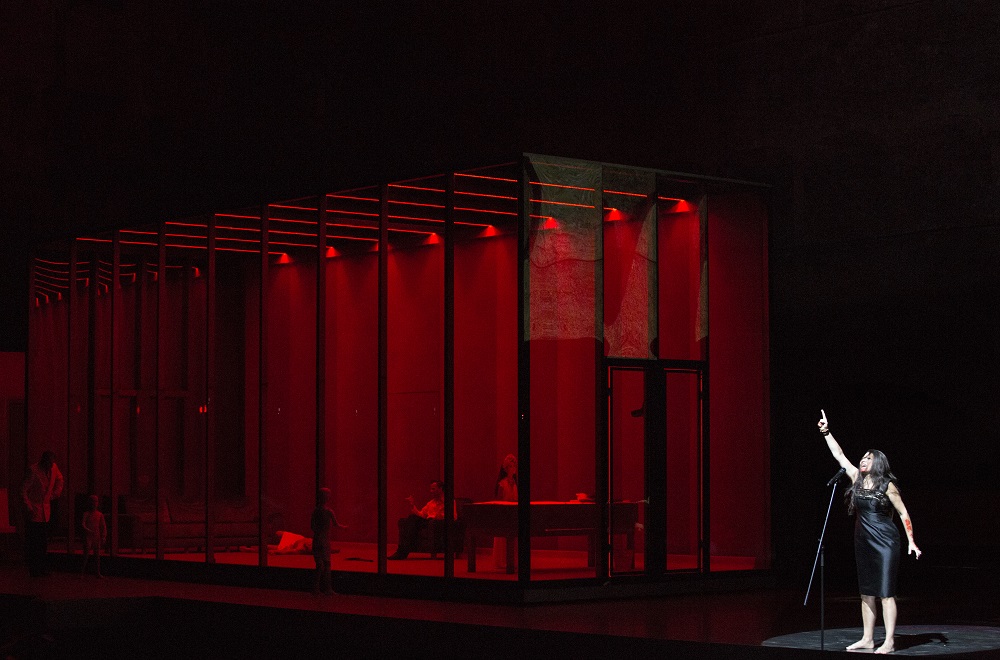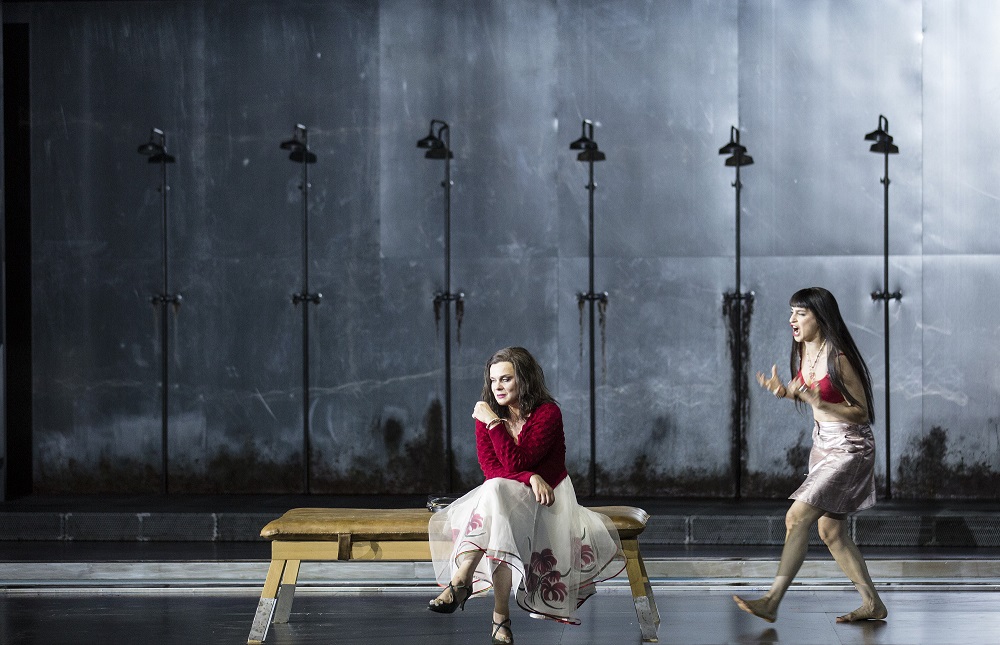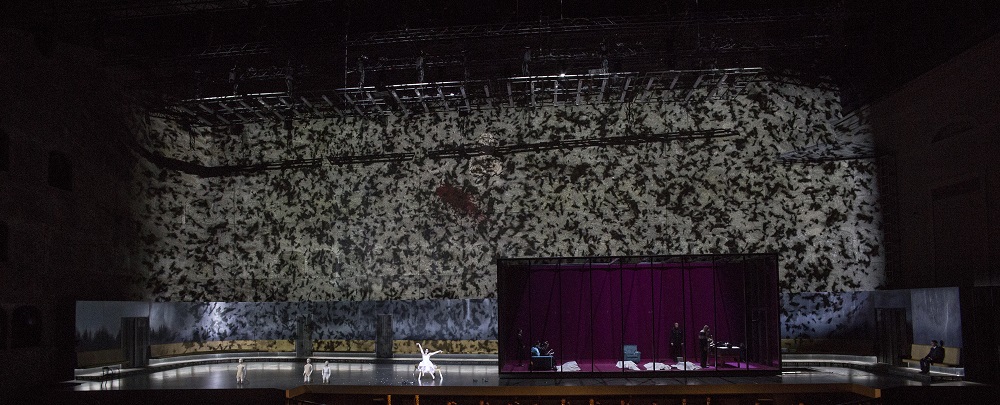Elektra, Salzburg Festival, Arte review - distancing, but not in the physical sense | reviews, news & interviews
Elektra, Salzburg Festival, Arte review - distancing, but not in the physical sense
Elektra, Salzburg Festival, Arte review - distancing, but not in the physical sense
Cold, analytical Strauss from Franz Welser-Möst and an odd array of performing styles

So much for the assertion that nowhere in the world would be staging the big Strauss and Wagner operas for the indefinite future. With a combination of lavish funding and good pandemic management on Austria's part, it’s been possible in Salzburg.
Some of that could be predicted with Franz Welser-Möst at the helm of the Vienna Philharmonic. He’s not a man of temperament, and while Strauss’s orchestral colours all emerge hand in glove with sensible articulation – even down to the heckelphone or bass oboe, rarely heard in the textures – the skin and viscera have been removed; only the bones remain. I had higher hopes for the work of often revelatory director Krzysztof Warlikowski; his Phaedra(s) with Isabelle Huppert was an unforgettable vision, and what he did with Janacek’s From the House of the Dead at the Royal Opera is burned on the memory. The most gripping slice of the drama actually comes in spoken text at the beginning – Clytemnestra’s speech after the murder of her husband in Aeschylus’s Agamemnon (I think; no credit is given in the film. The text of the play which Strauss adapted, is of course by great Austrian Hugo von Hofmannsthal, "freely after Sophocles"; his Everyman is performed annually at Salzburg).  Thrillingly declaimed by Tanja Ariane Baumgartner (pictured above), the speech promises us a strong Clytemnestra in the opera proper which, unfortunately, we don’t get. Baumgartner plays the guilty mother of, let’s say, 20 years later as something out of a hammy Hollywood movie of the 1950s, distracting big hair and all; the close-ups don’t do her any favours. There’s little chance of any shafts of sympathy indicated in the score; in the most unsettling image, a maid driven off naked in the first scene has been cut up for sacrificial ritual. The woman’s an unreal monster, though for once she's laden with the charms and talismans she sings about, removed – like various pairs of shoes in the course of the action – when there's the possibility of getting closer to a family member.
Thrillingly declaimed by Tanja Ariane Baumgartner (pictured above), the speech promises us a strong Clytemnestra in the opera proper which, unfortunately, we don’t get. Baumgartner plays the guilty mother of, let’s say, 20 years later as something out of a hammy Hollywood movie of the 1950s, distracting big hair and all; the close-ups don’t do her any favours. There’s little chance of any shafts of sympathy indicated in the score; in the most unsettling image, a maid driven off naked in the first scene has been cut up for sacrificial ritual. The woman’s an unreal monster, though for once she's laden with the charms and talismans she sings about, removed – like various pairs of shoes in the course of the action – when there's the possibility of getting closer to a family member.
The style is at odds with Lithuanian soprano Aušrinė Stundytė’s utterly convincing portrayal of an Elektra as on the brink of madness, all flashing eyes and inconsolable brooding, one who despite a few sassy tango steps in her first monologue clearly won’t be able to execute her dance of triumph after her brother’s murder of mother and lover. Stundytė, hitting all the top notes spot-on, can certainly sing the part, and the text is perfectly projected, though her husky sound takes some getting used to.  It’s perfectly offset by the soaring lyric soprano of Asmik Grigoryan (pictured above on the right with Stundytė). Her Chrysothemis is the sensible sister, though not the usual compromiser: tough, sassy and much more practical when it comes to the aftermath of the murder (what’s going on in the glass-box house distracts a bit from Elektra’s final monologue). There’s a plausible suggestion that Aegisth (Michael Lorenz) has been abusing his step-daughters. Even so, that scene of Elektra’s false greeting doesn’t work so well, and very often there are distractions from the one-to-ones; not so in the great Recognition Scene, where Derek Welton is utterly plausible as an unusually sympathetic, terrified and emotional Orest. Warlikowski’s handling of how brother and sister come so close to holding each other, but just can’t do it, is humane and convincing.
It’s perfectly offset by the soaring lyric soprano of Asmik Grigoryan (pictured above on the right with Stundytė). Her Chrysothemis is the sensible sister, though not the usual compromiser: tough, sassy and much more practical when it comes to the aftermath of the murder (what’s going on in the glass-box house distracts a bit from Elektra’s final monologue). There’s a plausible suggestion that Aegisth (Michael Lorenz) has been abusing his step-daughters. Even so, that scene of Elektra’s false greeting doesn’t work so well, and very often there are distractions from the one-to-ones; not so in the great Recognition Scene, where Derek Welton is utterly plausible as an unusually sympathetic, terrified and emotional Orest. Warlikowski’s handling of how brother and sister come so close to holding each other, but just can’t do it, is humane and convincing.
The visuals are striking, as one expects from any Warlikowski production. The walls of the Felsenreitschule – think Von Trapps at the pre-escape singing festival in The Sound of Music if you haven’t seen it in stony reality – are sometimes suggested, but Małgorzata Szczęśniak‘s set makes its own impact. Water that should, but can’t, purify the crimes is present, ready to pour from a row of showerheads and in the prominent shape of a stepped pool through which the ghost of Agamemnon solemnly wades during Elektra’s monologue. Felice Ross‘s lighting is perfectly attuned to the mood-changes of the score. And Kamil Polak's video work comes into its own at the end, a giddying substitute for the heroine’s dance of death; bluebottles over the streaks of blood multiply into swarms of black insects (pictured above), ready to pursue Orest as he flees the house. So many great ideas here, but it doesn’t all add up to an electrifying whole; Patrice Chéreau's vision in Aix, restaged at the New York Met three years after his death, still blazes the stronger. Still, it happened in summer 2020, and that’s the miracle.
Felice Ross‘s lighting is perfectly attuned to the mood-changes of the score. And Kamil Polak's video work comes into its own at the end, a giddying substitute for the heroine’s dance of death; bluebottles over the streaks of blood multiply into swarms of black insects (pictured above), ready to pursue Orest as he flees the house. So many great ideas here, but it doesn’t all add up to an electrifying whole; Patrice Chéreau's vision in Aix, restaged at the New York Met three years after his death, still blazes the stronger. Still, it happened in summer 2020, and that’s the miracle.
Add comment
The future of Arts Journalism
You can stop theartsdesk.com closing!
We urgently need financing to survive. Our fundraising drive has thus far raised £49,000 but we need to reach £100,000 or we will be forced to close. Please contribute here: https://gofund.me/c3f6033d
And if you can forward this information to anyone who might assist, we’d be grateful.

Subscribe to theartsdesk.com
Thank you for continuing to read our work on theartsdesk.com. For unlimited access to every article in its entirety, including our archive of more than 15,000 pieces, we're asking for £5 per month or £40 per year. We feel it's a very good deal, and hope you do too.
To take a subscription now simply click here.
And if you're looking for that extra gift for a friend or family member, why not treat them to a theartsdesk.com gift subscription?
more Opera
 Carmen, English National Opera review - not quite dangerous
Hopes for Niamh O’Sullivan only partly fulfilled, though much good singing throughout
Carmen, English National Opera review - not quite dangerous
Hopes for Niamh O’Sullivan only partly fulfilled, though much good singing throughout
 Giustino, Linbury Theatre review - a stylish account of a slight opera
Gods, mortals and monsters do battle in Handel's charming drama
Giustino, Linbury Theatre review - a stylish account of a slight opera
Gods, mortals and monsters do battle in Handel's charming drama
 Susanna, Opera North review - hybrid staging of a Handel oratorio
Dance and signing complement outstanding singing in a story of virtue rewarded
Susanna, Opera North review - hybrid staging of a Handel oratorio
Dance and signing complement outstanding singing in a story of virtue rewarded
 Ariodante, Opéra Garnier, Paris review - a blast of Baroque beauty
A near-perfect night at the opera
Ariodante, Opéra Garnier, Paris review - a blast of Baroque beauty
A near-perfect night at the opera
 Cinderella/La Cenerentola, English National Opera review - the truth behind the tinsel
Appealing performances cut through hyperactive stagecraft
Cinderella/La Cenerentola, English National Opera review - the truth behind the tinsel
Appealing performances cut through hyperactive stagecraft
 Tosca, Royal Opera review - Ailyn Pérez steps in as the most vivid of divas
Jakub Hrůša’s multicoloured Puccini last night found a soprano to match
Tosca, Royal Opera review - Ailyn Pérez steps in as the most vivid of divas
Jakub Hrůša’s multicoloured Puccini last night found a soprano to match
 Tosca, Welsh National Opera review - a great company reduced to brilliance
The old warhorse made special by the basics
Tosca, Welsh National Opera review - a great company reduced to brilliance
The old warhorse made special by the basics
 BBC Proms: The Marriage of Figaro, Glyndebourne Festival review - merriment and menace
Strong Proms transfer for a robust and affecting show
BBC Proms: The Marriage of Figaro, Glyndebourne Festival review - merriment and menace
Strong Proms transfer for a robust and affecting show
 BBC Proms: Suor Angelica, LSO, Pappano review - earthly passion, heavenly grief
A Sister to remember blesses Puccini's convent tragedy
BBC Proms: Suor Angelica, LSO, Pappano review - earthly passion, heavenly grief
A Sister to remember blesses Puccini's convent tragedy
 Orpheus and Eurydice, Opera Queensland/SCO, Edinburgh International Festival 2025 review - dazzling, but distracting
Eye-popping acrobatics don’t always assist in Gluck’s quest for operatic truth
Orpheus and Eurydice, Opera Queensland/SCO, Edinburgh International Festival 2025 review - dazzling, but distracting
Eye-popping acrobatics don’t always assist in Gluck’s quest for operatic truth
 MARS, Irish National Opera review - silly space oddity with fun stretches
Cast, orchestra and production give Jennifer Walshe’s bold collage their all
MARS, Irish National Opera review - silly space oddity with fun stretches
Cast, orchestra and production give Jennifer Walshe’s bold collage their all
 Káťa Kabanová, Glyndebourne review - emotional concentration in a salle modulable
Janáček superbly done through or in spite of the symbolism
Káťa Kabanová, Glyndebourne review - emotional concentration in a salle modulable
Janáček superbly done through or in spite of the symbolism

Comments
Excellent review David,but
Thanks for letting me know -
Thanks for letting me know - duly corrected.